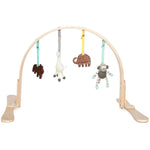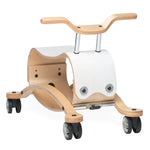Raise your hand if you’ve ever felt personally victimized by mom/dad-shaming online. Sigh! The Internet is a wonderfully informative and oh-so-cruel place to be. Navigating it is tough, especially when you're trying to absorb useful parenting techniques for your unique child and their needs, all while juggling the demands of being a working parent - downright scary, isn't it? The trolls and harsh judgments that your favorite mom-fluencer or dad-fluencer might face could discourage you from exploring certain waters, as people often love to paint everything as all-or-nothing, black-or-white.

They may make you feel like the barrier to entry in Montessori (or even being a good parent to begin with) is a million dollar replica of your house (sized adorably for your child) and about 27 hours in a day to endlessly thoughtfully interact with your babe. But fear not! We're here to gently guide you into the gray zone.
Here are our top five tips for introducing Montessori techniques into your busy schedule that don’t feel intimidating and will help you play the long game of raising an independent, self-sufficient, problem-solving little person.
-
(Inter)fear not: as long as your kiddo is safe, allow them to explore freely and without fearful verbal direction such as ‘be careful’ (this can actually be counter intuitive!). Montessori, as conceived by Dr Maria Montessori, highly values self-directed learning and hands-on experiences. Learning should be a dynamic and engaging experience and if you have a little faith, your child will lead you to their area of interest which can spark a whole new world of thoughts and ideas.
-
Declutter: children are highly intuitive and their physical environment can have a serious impact on their emotional state. A clutter-free zone not only fosters a more peaceful atmosphere but also allows your child to focus, explore, and engage with their surroundings (and with you!) in a meaningful way. Remember, a tidy space can contribute to a happy heart and a curious mind. Speaking more closely to our mamas & papas with kiddos on the spectrum, this is also one of the most valuable techniques to avoid overstimulation and help your child self-regulate.
-
Embrace the struggle: contrary to what highlight-reels of some influencers may lead you to believe, Montessori-practicing children aren’t born with built-in milestones, manners and mindfulness. The often-unseen reality involves sitting through the discomfort of allowing your child to problem-solve independently. Yes, it can be frustrating and time-consuming. Yet, persevering through those moments - perhaps enduring a Guinness record-worthy amount of time to put on a sock - instills the confidence needed for them to develop problem-solving skills and tackle more substantial tasks independently.
-
Feel the big feelings: being a parent is really hard. Being a toddler is really hard! You’re both on your first merry-go-round of this life and figuring out how to thrive in your coexistence. I know that I sometimes feel like the best solution to my problems is to stomp my feet and cry, so why would your toddler be immune? The key to helping your child weather a storm is to be present in it with them and allow them to feel it. It’s tough to see your child in distress and our most basic instinct is to fix whatever is troubling them, but what’s far more beneficial is to show them that their feelings don’t scare us; that we can see them through and that we will still be there afterwards. Getting down on eye level with them will help you coregulate, and physical touch (if welcomed) can be a healing force of its own.
- Give yourself grace: nobody is a perfect parent 100% of the time. In the midst of wanting to patiently endure a tantrum in the grocery store to help your child regulate, reality might demand that you pick them up (kicking and screaming) to make it to daycare on time for work. What you consistently do, particularly most of the time, will leave the most profound impact on your child in the long run. Whether you're feeling burned out from work, touched-out by little hands, or grappling with PPD, it's okay. Everyone has a breaking point, and your child might witness you reaching yours. Don’t judge yourself harshly, and most importantly, don’t underestimate the power of communication - even if your child is not yet verbal - and the power of an apology. Modeling healthy expressions of frustration, grief, and burnout equips your child with lifelong tools, especially as they grow up and navigate their own interpersonal relationships, influencing what they recognize as acceptable or not.
















